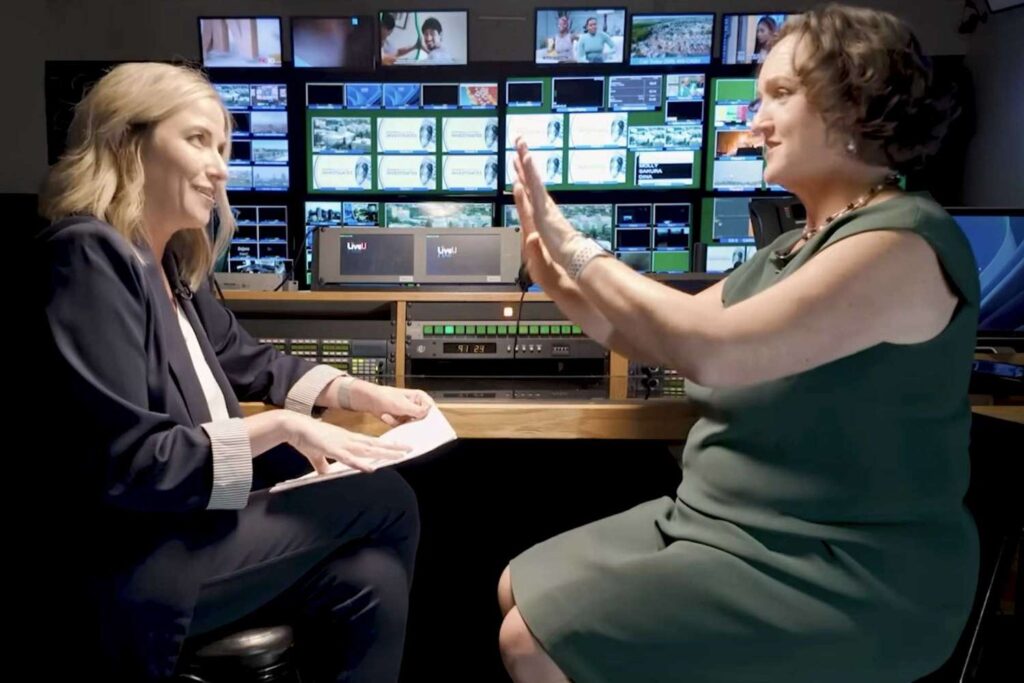NEED TO KNOW
A journalist’s pre-taped interview with California gubernatorial candidate Katie Porter turned unexpectedly tense — and the news station aired the fiery exchange for full transparency.
Julie Watts, an investigative reporter with CBS News Sacramento, sought to interview all the major candidates who are running in California’s 2026 gubernatorial race, asking each candidate the same questions to show viewers where they stand on major issues.
One of those candidates was Porter, a former congresswoman who currently leads the pack in polling.
On Monday, Oct. 6, the news station released a 30-minute video that showed how each candidate responded to the issue of redistricting in California.
CBS News Sacramento/YouTube
The tone of Porter’s interview, which began with Porter saying that she supports redistricting, turned suddenly sour after Watts asked the Democratic candidate a follow-up question about the nearly 40% of Californians who voted for Republican Donald Trump in 2024. Watts wondered how Porter would try to reach some of those Trump voters in order to guarantee a victory, and in response, Porter furrowed her brow.
“How would I need them in order to win, ma’am?” Porter, 51, scoffed, before laughing to someone out of the frame.
“Well, unless you think you’re going to get 60% of the vote,” Watts replied. “You think– everybody who did not vote for Trump will vote for you?”
“In a general election? Yes,” Porter said. “If it’s me versus a Republican, I think that I will win the people who did not vote for Trump.”
CBS News Sacramento/YouTube
California has a blanket primary system, meaning candidates from all parties will compete on the same primary ballot in June. The top two candidates — regardless of party affiliation — will move forward to the general election in November 2026.
Watts raised the possibility that Porter would need to target Trump voters if the general election ended up being between her and another Democrat, and Porter responded: “I don’t intend for that to be the case.”
Watts then appeared confused by Porter’s confidence that no other Democrats would advance in the primary, and asked if she was planning to urge the other Democratic candidates not to run.
Porter instead implied that her name recognition and trust as a public figure will keep other Democratic campaigns from succeeding. The former congresswoman also noted that she has won elections in purple districts before and said she has proven capable of earning Republican votes, too.
Watts then pointed out that Porter had claimed moments ago that she didn’t need Trump voters to win the election. Porter put her hands out toward Watts in frustration and said, “I feel like this is unnecessarily argumentative. What is your question?”
The two then went back and forth on the semantics of the question that was being asked. Watts said that she was not intending to be argumentative but that all the other candidates she’d spoken with had done the same interview without an issue.
Eventually, Porter stopped mid-sentence and looked toward someone off screen, saying, “I don’t want to keep doing this. I’m going to call it.”
“You’re not … going to do the interview with us?” Watts said in disbelief. Porter replied, “Nope, not like this, I’m not. Not with seven follow-ups to every single question you ask.”
Watts told her that “every other candidate” has participated in the interview series and answered follow-up questions. “I don’t care. I don’t care,” Porter replied, saying she wanted “a pleasant, positive conversation” that focused on her policy views.
Watts, frustrated, said that she is an investigative reporter and follow-up questions are a part of the job.
“I have never had to do this before, ever,” Porter said.
“You’ve never had to have a conversation with a reporter?” Watts shot back.
“To end an interview,” Porter said.
After more back and forth, Porter — defeated — said, “I don’t want to have an unhappy experience with you. And I don’t want this all on camera.”
Porter, a Democratic lawyer who represented competitive California congressional districts from 2019 to 2025, left Congress to run for Dianne Feinstein’s former Senate seat. She placed third in the 2024 Senate primary, behind Republican Steve Garvey and Democrat Adam Schiff. Schiff handily won the general election.
After her Senate loss, Porter threw her hat into the 2026 gubernatorial race, seeking to replace California Gov. Gavin Newsom after he terms out. The race remains crowded with eight months until the nonpartisan primary, which will narrow the pool to just two candidates.
Other Democrats in the running include former California Attorney General-turned-U.S. Health Secretary Xavier Becerra, former Los Angeles Mayor Antonio Villaraigosa, former California state Controller Betty Yee, California state Superintendent Tony Thurmond, and several more.
On the Republican side, candidates like Riverside County Sheriff Chad Bianco and conservative political commentator Steve Hilton have garnered attention.

